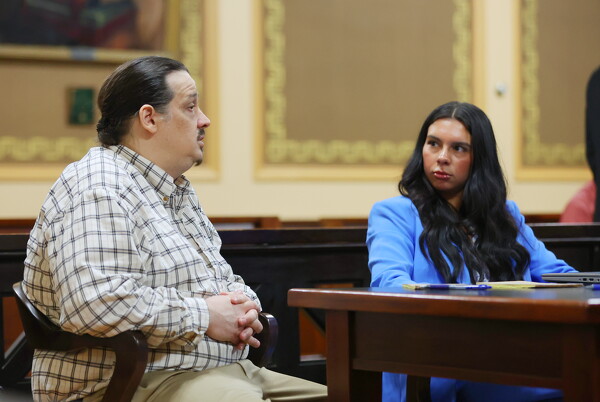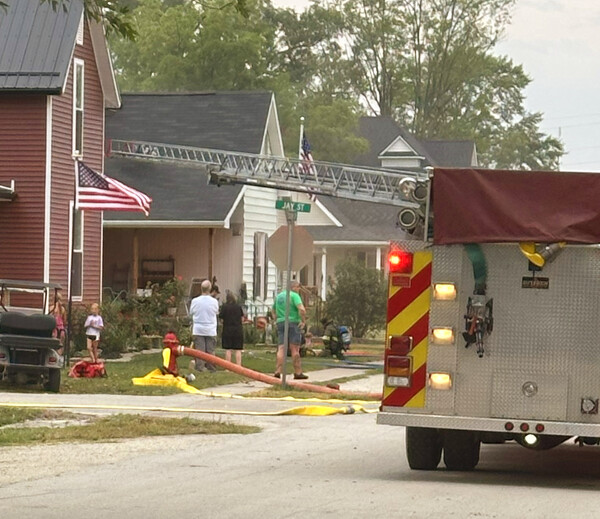Wednesday, July 16th, 2025
Fort officials present new income tax plan
By William Kincaid
FORT RECOVERY - A proposal to raise Fort Recovery's income tax rate to 1.5% would provide a more stable revenue stream for village officials to better craft the operating budget, tackle rising costs across the board and pursue additional improvement projects.
Perhaps just as importantly, especially for residents living on fixed incomes, the proposal would provide some relief by "zeroing out" four property tax levies on the book, village administrator Randy Diller said at a public forum held Tuesday night at the Cooper Brothers Community Pavilion.
"People that have bought their house years ago, that was all paid off, maybe paid $50,000 for it 40 years ago, and now all of a sudden it's appraised at $300,000 … and now their real estate taxes are way out of line with what their income is. They just can't afford paying it," Diller said. "The last thing anybody wants is for somebody to lose their house because they can't afford their real estate taxes."
The overall taxing burden, Diller argued, would be taken off the backs of property owners and shared by all earners. Retired residents' revenue from pensions, Social Security benefits and other sources would remain tax-exempt.
"So we'll take the burden away from just the property owners and we'll put it onto anybody that has an earned income. So that could be a renter, somebody that lives out of town and works in town, obviously those that live here and work here," Diller said.
About 25 people, including some village officials, turned out to hear more about the income tax levy being considered by councilors. Attendees appeared to be generally supportive of the idea, asking just a few questions.
Councilors will vote on final reading of legislation to put the income tax hike on the Nov. 4 general ballot at their next meeting, scheduled for 7:30 p.m Monday at the village office.
"Part of this is, we're going to do away with four property tax levies, so in the end we feel as though this may help us continue on for a little longer here," said Mayor Dave Kaup. "Obviously our income has been down with a couple of the factories very slow and one of them had their fire and we lost a lot on that."
The proposal calls for pushing up the village income tax from 1% to 1.5%. Should the levy be passed by voters, councilors vowed to "zero out" - or stop collecting revenue from - the four real estate tax levies on the books totaling 9.8 mills that currently bring in $294,583 annually.
The current 1% income tax garners about $1 million each year. Increasing the rate to 1.5% would generate an addition $500,000 to $750,000 a year, based on the local economy, according to Diller.
Increasing the income tax rate to 1.5% and zeroing out the property taxes would result in a net gain of $200,000 to $450,000 a year to the village's coffers, again based on the local economy. Property tax bills would tumble 14% for owner-occupied homes, 12% for non-owner occupied residences and 18.4% for a commercial business or industry, Diller estimated.
At the same time, the income tax credit would rise from 1% to 1.5%.
Essentially, the 1.5% income tax would be paid by people who live and work in Fort Recovery. Those who live Fort Recovery but work in a community with a 1% income tax would pay an addition 0.5% income tax to Fort Recovery.
Those who live in Fort Recovery and work in a community with a 1.5% income tax, as well as retired residents, would see no increase.
Fort Recovery, Ansonia, Chickasaw and Rockford are the only local communities that levy a 1% income tax. Other municipalities assess at least 1.5%, Diller said.
"Rockford's a little different because they don't allow any credits," he pointed out. "If you live in Rockford, you are paying that 1% no matter who else you're paying."
For instance, a Rockford resident working in Celina pays an income tax of 1.5% to the city on top of 1% to Rockford.
Diller noted several pending and forthcoming projects in Fort Recovery that are expected to cost millions of dollars in the next few years. Improvements to the 41-year-old water treatment plant are estimated between $3 million to $4 million.
The North Wayne Street pump station needs replaced, and the village has launched a five-year street light conversion initiative. The village would like to one day purchase additional land for an industrial park and cover the expense of extending utilities to future housing developments.

